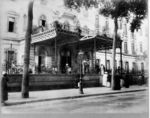Difference between revisions of "Chapter 3"
| Line 37: | Line 37: | ||
A mountebank is person who sells quack medicines from a platform, a boastful unscrupulous pretender, or charlatan. | A mountebank is person who sells quack medicines from a platform, a boastful unscrupulous pretender, or charlatan. | ||
| + | 89/90 - '''Fashoda'''<br /> | ||
| + | African town (present day Kodok) & the subject of a major diplomatic/territorial dispute--and quite nearly a military one--between the French and the British in 1896. Both countries were snapping up territory in Africa, & both claimed Fashoda for their own. The dispute was "won" by the British, but both sides nearly went to war over the issue. See [http://en.wikipedia.org/wiki/Fashoda_Incident wikipedia] | ||
| + | |||
==References== | ==References== | ||
<references /> | <references /> | ||
{{V PbP}} | {{V PbP}} | ||
Revision as of 07:39, 23 October 2007
- Please keep these annotations SPOILER-FREE by not revealing information from later pages in the novel.
It is clearer in Pynchon's short story Under The Rose (which he repurposed for V.) why Porpentine is murdered "under the duello". He had violated "a tradition in espionage where everything was tacitly on a gentlemanly basis" [1]:
- "'You screamed at the Chief,' Bongo-Shaftsbury announced. 'You said: Go away and die.'" [2]
From Pynchon's introduction to his short-story collection Slow Learner :
- "Loot the Baedeker I did, all the details of a time and place I had never been to, right down to the names of the diplomatic corps. Who'd make up a name like Khevenhüller-Metsch?" [3]
Likely a reference Karl Richard Lepsius (1810-84), German Egyptologist and the author of numerous books including Chronologie der Aegypter (which laid the foundation for a scientific treatment of early Egyptian history) and Todtenbuch (the Egyptian Book of the Dead) (1867); Lepsius was involved with the study of ancient Egyptian blue glass and its possible material sources, particularly the turquoise blue and greenish-blue of some Egyptian glass.[4] Wikipedia entry
From Henry Adams' "Les Miracles de Notre Dame" in Mont Saint Michel and Chartres:
- "[the Virgin] was above the law; she took feminine pleasure in turning Hell into an ornament" [5]
From Pynchon's short story Entropy:
- His had always been a vigorous, Italian sort of pessimism: like Machiavelli, he allowed the forces of virtù and fortuna to be about 50/50; but the equations now introduced a random factor which pushed the odds to some unutterable and indeterminate ratio which he found himself afraid to calculate. [6]
From this BBC Website:
- In order to accommodate Egypt's increasing tourist numbers as well as those passing through en route to India, new hotels were quickly created to cater for them. The first were built in Cairo, and as early as the 1840s, Samuel Shepheard was managing the British Hotel in the city's European quarter. Facing the Ezbekieh Gardens, flanked by mosques and convenient for most amenities, it quickly gained a reputation for good management and Shepheard soon had his name over the door.
- With the old palace replaced by a purpose-built hotel at the turn of the 20th century, the new Shepheard's remained a firm favourite with British and American tourists and a symbol of colonial rule. As the place to stay when in Egypt, some checked in simply for the social life and saw 'less of Egypt than they would if they remained in London and went to the Egyptian Department in the British Museum' wrote one observer in 1908. From the vantage point of the hotel's terrace and cocktail bar, where 'waiters glided about wearing fezzes and inscrutable Egyptian expressions' (according to Noel Coward), socialites could see and be seen in an atmosphere described as 'Eighteenth Dynasty Edwardian'.
85/86 - Girgis the mountebank
A mountebank is person who sells quack medicines from a platform, a boastful unscrupulous pretender, or charlatan.
89/90 - Fashoda
African town (present day Kodok) & the subject of a major diplomatic/territorial dispute--and quite nearly a military one--between the French and the British in 1896. Both countries were snapping up territory in Africa, & both claimed Fashoda for their own. The dispute was "won" by the British, but both sides nearly went to war over the issue. See wikipedia
References
- ↑ Pynchon, Thomas, Slow Learner, Jonathan Cape, 1985, p.102
- ↑ Slow Learner, Op.Cit., p.136
- ↑ Slow Learner, Op.Cit., p.17
- ↑ Lucas, Alfred, Ancient Egyptian Materials and Industries, 1926
- ↑ Adams, Henry, Mont Saint Michel and Chartres and The Education, The Library of America, 1983, p.596
- ↑ Slow Learner, Op.Cit., pp.87-88
| Chapter 1 In which Benny Profane, a schlemihl and human yo-yo, gets to an apocheir 9/1 |
Chapter 2 The Whole Sick Crew 44/39 |
Chapter 3 In which Stencil, a quick-change artist, does eight impersonations 61/59 |
Chapter 4 In which Esther gets a nose job 95/97 |
|---|---|---|---|
| Chapter 5 In which Stencil nearly goes West with an alligator 111/115 |
Chapter 6 In which Profane returns to street level 134/141 |
Chapter 7 She hangs on the western wall 152/161 |
Chapter 8 In which Rachel gets her yo-yo back, Roony sings a song, and Stencil calls on Bloody Chiclitz 213/229 |
| Chapter 9 Mondaugen's story 229/247 |
Chapter 10 In which various sets of young people get together 280/305 |
Chapter 11 Confessions of Fausto Maijstral 304/333 |
Chapter 12 In which things are not so amusing 347/385 |
| Chapter 13 In which the yo-yo string is revealed as a state of mind 367/407 |
Chapter 14 V. in love 393/437 |
Chapter 15 Sahha 415/461 |
Chapter 16 Valletta 424/471 |
| Epilogue, 1919 456/507 |

